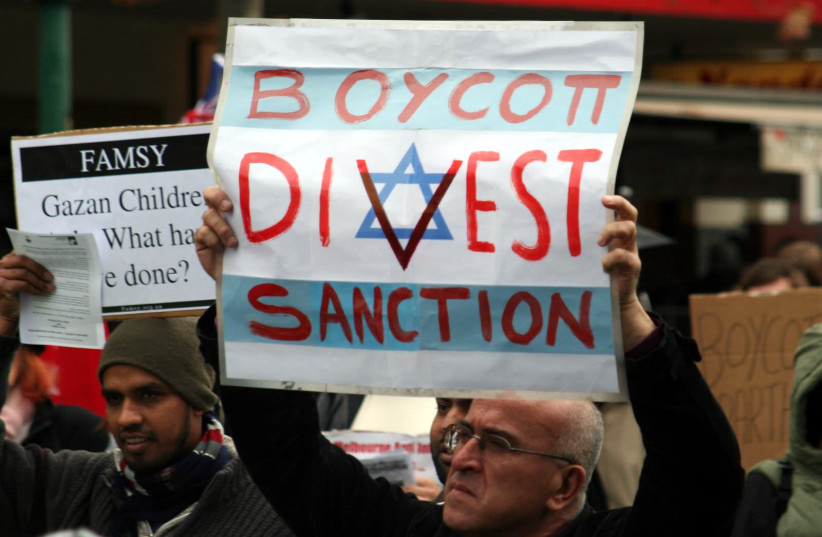Marc Pozniak was at that infamous Durban conference some 20 years ago – a witness to the worst public outburst of antisemitism since the defeat of the Nazis almost 50 years earlier.
A South African international relations and law student, Pozniak attended the UN World Conference against Racism, Racial Discrimination, Xenophobia and Related Intolerance, held in his native country, to take part in the Global Youth Summit.
Almost immediately, he was buffeted by the virulent anti-Zionism and antisemitism of his fellow delegates.
The first session he attended was on “new forms of colonialism and imperialism.”
When Israel came to be the subject, he writes in his chapter in this book of 12 essays, there was “wave after wave of speeches about the heinous and vile apartheid State of Israel.”

When he left the session, he found that “the foyer of the hotel had been transformed into a bazaar of hatred” with “anti-Israel T-shirts, banners and cartoons openly on display.”
Shocked by what he had seen, Pozniak joined a small group of Jewish delegates who, with the help of the Jewish Durban community and the South African Jewish Board of Deputies, were trying to present a different perspective.
They tried to give out “Flowers for Peace” “but were quickly surrounded by hordes of people screaming at us and threatening us.”
When they tried to give out T-shirts with Martin Luther King’s quote “When people criticize Zionists, they mean Jews,” they had to be rescued from a menacing mob by the police.
Later, while Pozniak was talking to another delegate at the conference, someone informed his interlocutor that he was Jewish. As if to confirm the truth of Martin Luther King’s aforementioned quotation, the man said, “I’m sorry. I had no idea [that Pozniak was Jewish].” He then walked away.
That gathering became “the catalyst for the ‘new’ antisemitism and the BDS movement,” write book editors Lola Fraser and Ronnie Fraser. Things got so bad in Durban that both the US and Israel withdrew their delegations.
The goal of the BDS movement: Eliminate the Jewish state
SINCE ITS inception, the goal of BDS clearly has been to weaken, delegitimize and eventually eliminate the Jewish state. Its often repeated slogan – “From the river to the sea, Palestine will be free” – leaves little doubt that there is no room for an independent Jewish state in their vision.
To achieve that end, a strategy was adopted at the NGO Forum at the 2001 Durban conference, which called for “the complete isolation of Israel as an apartheid state.”
Based on that strategy, the first boycotts were initiated in Britain against Israeli universities. Since then, there have been many BDS campaigns targeting companies like SodaStream and Airbnb, Israeli banks and universities, and products made in Israel and in the territories.
Evaluating those campaigns, “the lack of economic impact is notable,” writes Gerald M. Steinberg, emeritus professor of political science at Bar-Ilan University in Ramat Gan. “Despite 20 years of such efforts and massive funding for BDS, the Israeli economy has thrived,”
In some places, the campaign has appeared to backfire. The German Bundestag has passed a resolution equating BDS with antisemitism, and some 35 states in the US have passed legislation against BDS, the editors note.
While some academic organizations have adopted the BDS mantra, they have largely failed in efforts to isolate Israel.
However, where BDS is active, it often creates a “toxic climate” for Zionists and Jews on university campuses, writes Miriam F. Elman, executive director of the Academic Engagement Network.
“BDS activism tends to isolate, demean and marginalize Jews, Zionists and Israelis on campus.”
It is therefore reasonable to assume this hostile atmosphere may have discouraged some Jews and Zionists from taking part in the Israeli-Palestinian debate at some universities.
BDS’s primary goal is to “brand Israel as a pariah state,” writes Eran Shayson, CEO of the nonprofit Reut Group, Therefore, even if an economic boycott fails, the media exposure that the attempt generated is a victory for BDS because the boycott’s buzz may create in the public mind “false associations between Israel and apartheid.”
However, he says that several factors –including the Abraham Accords between Israel and some Arab states, legal actions taken by Israeli supporters and the war in Ukraine – may be weakening the BDS movement.
From his mouth to God’s ear.
The writer’s memoir, Figs and Alligators: An American Immigrant’s Life in Israel in the 1970s and 1980s (Chickadee Prince Books), is available online and at bookstores.
Challenging the Boycott, Divestment and Sanctions (BDS) Movement
Edited by Ronnie Fraser and Lola Fraser
Routledge
251 pages; $44.95
